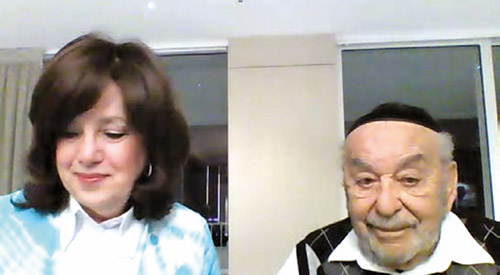
On Wednesday, Feb. 3, the Jewish Renaissance Experience and Young Israel of White Plains (YIWP) viewed a conversation with “Zaidie” Joe Bistritz, a Holocaust survivor and father of YIWP’s Janice (Bistritz) Mirsky.
Bistritz was born in Bucovina, Romania. At age 5, his family moved to the Romanian province of Transylvania. His town had 400 Jews, mostly chasidic, but almost all were businessmen, with a few doctors and lawyers. Bistritz described their beautiful big shul and very religious atmosphere.
“A boy’s hair was cut at 3 and then right to cheder. At 6, they started to learn Gemara; a strong educational system started at an early age,” he said.
Secular education was also provided. His family included his parents, three sisters and a younger brother. The family operated a leather goods factory for ladies’ handbags, briefcases and luggage. His grandfather also lived in Transylvania, about 250 miles away. He spent a lot of time with his grandfather.
“He taught me things. At that time, I didn’t grasp the importance of what he was saying; I took advantage of it later on when it started to make sense,” reflected Bistritz.
In 1940, there were cries for Hungary to join the Axis power. The Hungarian army marched into Transylvania, mobilized the youth and gave them shovels to dig ditches to fill the next day. “We had no idea of what was going on in Poland and the camps,” Bistritz shared.
Just after Passover 1944, they were ordered to pack no more than two suitcases and appear at the train station. “We had no idea where we were going, but orders were orders,” Bistritz recalled, adding that the police were also at the station. Bistritz’s family traveled to a nearby city and were held in a lumber yard. After two weeks, they were put into cattle cars, “70-75 people per car, no room to sit, only to stand. After three days, arriving at Auschwitz, we lined up as a family. My father was first and Mengele motioned him to the right. I was behind him, he motioned me the right. My mother was with my little brother. My mother was 39 years old, but since she had a child with her, she went with the child. We went to the labor side and they went to the crematoria.” That was the last time Bistritz saw his mother.
After two weeks at Auschwitz, he was transferred to Buchenwald. “I was in nine camps,” stated Bistritz. His time at Ohrdruf, a Buchenwald subcamp, was the hardest labor camp experience. He detailed that they were building a factory inside a mountain. Bistritz was forced to carry 85 pounds of cement on his shoulders. Bistritz also told of a barrack mate who had a “funny” habit of covering his head in a blanket each morning. The man later confided that he had tefillin shel rosh, enabling Bistritz to put on tefillin daily.
On arrival at a different camp, they separated prisoners by trades. When they called physicists, he went with them. By working indoors, he collected cigarette butts that he traded for food.
While in his final camp, the guards suddenly abandoned their posts. Once he was on the road outside, he and his friend “threw” a motorcyclist off his vehicle and then found American soldiers in a nearby town to lead them to the DP camp. The Americans provided food and clothing. Now liberated, many survivors returned to their hometowns hoping to find other survivors.
Heading east, at a DP camp in Translav in the Russian zone of Germany, Bistritz found his three sisters, who had been able to stay together. On returning to Transylvania, they had to make a living. Bistritz stated, “I opened a leather store for shoemakers.” He was just 18 years old and was able to support the family. Four weeks later, his older sister’s fiancé reappeared, and they got married. Bistritz revealed that, after the war, he remained a religious Jew. “To me, there was no other way of life; I couldn’t imagine myself surviving without the way I was, growing up. It‘s so ingrained in you.”
Their hometown bordered Hungary. By falsifying documents, he helped transport hundreds of Jews across that border on their way to Israel and the U.S. He similarly obtained his own Canadian visa, but was arrested in Prague for forgery. With bribes from his organization, the judge sentenced him to leave the country immediately.
Arriving in Canada in 1948, he studied North American history and English while also receiving semicha. His first pulpit was in Niagara Falls, Canada. After marrying a Baltimore girl, they settled in Miami Beach and raised four children.
His latest project is learning all of Shas and he has shared siyumim with his grandchildren. After all these experiences, he summarized, “I still have faith in humanity, and you should never give up hope.”
By Judy Berger










